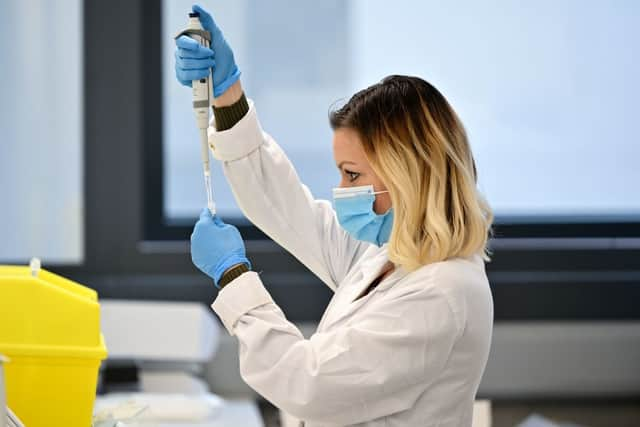What is Deltacron? Delta-Omicron Covid hybrid detected in UK - what are the symptoms and how many cases?
This article contains affiliate links. We may earn a small commission on items purchased through this article, but that does not affect our editorial judgement.
and live on Freeview channel 276
A hybrid of the Delta and Omicron Covid variants has been detected in the UK, scientists have confirmed.
Dubbed ‘Deltacron’, the new strain combines lineages of both variants, but it is still unclear whether it is more severe or contagious than its predecessors.


What is known about Deltacron?
Advertisement
Hide AdAdvertisement
Hide AdDeltacron has been suspected in several countries, but virologists at L’Institut Pasteur in Paris submitted its full genomic sequence on Tuesday to the international Covid database, GISAID, meaning it has officially been confirmed as a variant.
Analysis of the strain’s genetic code shows that the “backbone” of the variant is derived from Delta, while the spike protein - the part of the virus that attaches itself to human cells - originates from the Omicron variant.
The World Health Organisation (WHO) said it is “tracking and discussing” Deltacron following research into the strain.
Maria van Kerhove, the Covid technical lead for the WHO, tweeted that recombinant viruses (which emerge when a person is infected with two variants at the same time) were “to be expected, especially with intense circulation of Omicron and Delta”.
Advertisement
Hide AdAdvertisement
Hide AdScientists have described the variant as “the real thing” and warned its emergence highlights the importance of maintaining genetic surveillance of Covid variants in the UK.
Professor Lawrence Young, a virologist at Warwick University, told The Independent: “This looks like the real thing. An authentic recombinant.
“We need to keep an eye on its behaviour in terms of transmissibility and ability to evade vaccine-induced immune protection.”
Fellow virologist Dr Stephen Griffin, from the University of Leeds, agreed saying: “Whilst it doesn’t seem to have taken off as a dominant strain yet, this could be due to a very slow start based upon seeding density - the number of initial cases.
Advertisement
Hide AdAdvertisement
Hide Ad“There are multiple scenarios that can play out here in terms of what this means for people that become infected as this combination of viral proteins may behave differently to either parent.
“The French cluster appears to be a validated occurrence where a recombination event has given rise to a virus fit enough to circulate."
Aris Katzourakis, professor of evolution and genomics at the University of Oxford, added: “It is one to keep an eye on. This one is legit."


How many cases have been detected?
At least 41 patients have been identified with Detlacron in the US and Europe since the variant first flagged in January, including in A case of Deltacron has been found in northern France, Denmark and the Netherlands.
Advertisement
Hide AdAdvertisement
Hide AdHealth chiefs told The Sun that a “very small” number of cases have been detected in the UK, with more details set to be reported in a briefing on Friday.
The UK Health Security Agency (UKHSA) announced in February that one case of Delta x Omicron had been discovered in the UK, which developed in an individual who had contracted both variants.
However, scientists stress that there is now substantial immunity among the human population against both the Delta and Omicron variants thanks to high levels of vaccination.
As such, it is thought that the new strain should not pose a danger to vaccine effectiveness.
What are the symptoms?
Advertisement
Hide AdAdvertisement
Hide AdAs little is still known about the Deltacron variant, it is unclear if symptoms of the strain are more or less severe than its predecessors.
The Omicron variant has generally been found to cause milder symptoms, with the UKHSA estimating that someone infected with Omicron is between 31% and 45% less likely to attend A&E, and 50% to 70% less likely to be admitted to hospital than someone infected with Delta.
The main symptoms of the Delta strain include a high temperature, a new continuous cough, and a loss or change in sense of smell or taste.
By comparison, Omicron symptoms tend to be similar to the common cold and typically include:
- a runny nose
- headache
- sneezing
- a persistent cough
- a sore throat
Advertisement
Hide AdAdvertisement
Hide AdOther signs can also include fatigue, body aches and pains, nausea and night sweats.
Are Covid cases rising in the UK?
The UKHSA has warned that Covid cases are still very high in the UK and are increasing among older age groups.
New data from Imperial College London’s React-1 study reveals that cases in England are surging in the over 55s and hospitalisations have shown an “uptick” in the past fortnight.
Researchers suggest the rising infections are being driven by the BA.2 sub-lineage of Omicron, known as ‘Stealth Omicron’, coupled with increased social mixing since restrictions eased on 24 February.
Advertisement
Hide AdAdvertisement
Hide AdIt is also thought that the waning effectiveness of the vaccine booster could also be to blame, particularly as older people received their top-up dose six months ago.
Dr Jenny Harries, chief executive of the UK Health Security Agency (UKHSA), said: “These data confirm that cases have declined substantially following the peak of the Omicron wave.
“However, the increasing presence of the BA.2 sub-lineage of Omicron and the recent slight increase in infections in those over 55 show that the pandemic is not over and that we can expect to see Covid circulating at high levels.
“Vaccination remains the best way to protect us all from severe disease and hospitalisation due to Covid-19 infection. We urge you to come forward for your primary or booster doses straight away if you have not already done so.”
A message from the editor:
Advertisement
Hide AdAdvertisement
Hide AdThank you for reading. NationalWorld is a new national news brand, produced by a team of journalists, editors, video producers and designers who live and work across the UK. Find out more about who’s who in the team, and our editorial values. We want to start a community among our readers, so please follow us on Facebook, Twitter and Instagram, and keep the conversation going. You can also sign up to our newsletters and get a curated selection of our best reads to your inbox every day.
Comment Guidelines
National World encourages reader discussion on our stories. User feedback, insights and back-and-forth exchanges add a rich layer of context to reporting. Please review our Community Guidelines before commenting.
